

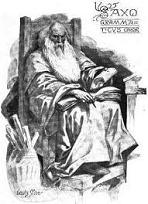
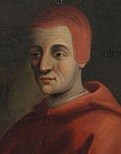


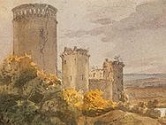
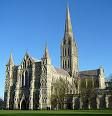
1220 On Mar. 31 the Muslims attack the Crusader camp in Damietta; on Aug. 29 the Crusaders counterattack the Muslim camp; meanwhile after Pelagius of Albano keeps refusing to let John of Brienne rule Damietta, he gets fed up and returns to Acre, and Pelagius requests Frederick II to come with a fresh army. On May 17 English king (since Oct. 28, 1216) Henry III of England (1207-72) is crowned at Westminster Abbey (until Nov. 16, 1272). In June Scottish king Alexander II reaches an agreement with English king Henry III to marry his sister Joanna, while his own sisters Margaret and Isabel are only promised "suitable" but non-royal English husbands by Oct. 1221. On July 7 the relics of St. Thomas Becket are translated in the Cathedral of Canterbury in Kent, England, presided over by archbishop Stephen Langton. On Nov. 22 Pope Honorius III crowns Frederick II as HRE, correcting the oversight of his predecessor Innocent III, which isn't enough to make him go on the crusade; Frederick's son Henry (VII) (1211-42)) is elected king of Germany (until 1235). Leading a punitive expedition against the Khwarezm Empire in E Persia (ends 1223), the Mongol hordes of Genghis Khan (1162-1227) invade Transoxiana and Khorasan; under Genghis' son Juji they defeat 400K Khwarezm troops in the Battle of Jand, killing 160K, and causing Kwarezmshah Ala al-Din Muhammad (Alaeddin Mohammed) II to flee to Samarkand; the main army under Genghis Khan destroys Bukhara, raping thousands of women and massacring 30K men; Samarkand and Balkh surrender, only to suffer massacre and ruin, causing the shah to flee to a small Caspian Sea island, where he dies, and is succeeded by Jalal al-Din Manguberdi (-1231), the last Khwarem shah; 70K Mongols under Genghis' son Tule ravage Khorasan, making captives fight against their fellow soldiers or die; they capture and destroy Merv, known for its magnificent libraries, allowing the pop. to march through the gates with their treasures, killing all 1.3M (1.748M) in 1 hour? After accompanying Peter II of Courtenay from Rome as papal legate and being captured with him then released, Cardinal Giovanni Colonna (1170-1245) becomes regent of the Latin Empire of Constantinople (until Mar. 25, 1221). Angkor loses its dominance over the Cham. The Kingdom of Zimbabwe ("great stone houses") is founded by settlers from the Kingdom of Mapungubwe, with capital at Great Zimbabwe; the Kingdom of Mutapa eclipses it by 1450. Marie de Saint-Clair (1192-1266) succeeds Jean de Gisors as grandmaster of the Priory of Sion (until 1266) :). Czestochowa (Czanstochowa, Czestochow) on the Warta River in S Poland is first mentioned. Nysa (Neisse) is founded in SW Poland on the Nysa River (Glatzer Neisse) 47 mi. SE of Wroclaw in Silesia. About this time after a large group and students and professors walk out of the U. of Bologna in search of more academic freedom, HRE Frederick II founds the U. of Padua in Italy to teach law and theology, followed in 1222 by medicine, and by 1399 it divides into two schools, one for civil and canon law, and the other for medicine, grammar, rhetoric, dialectic, philosophy, and astronomy; in a mere three cents. it becomes home to one of the first botanical gardens in Europe (1545), going on to produce giants incl. Andreas Vesalius and Galileo Galilei; in 1595 its anatomical theater begins performing public dissections. Spanish-born St. Dominic (1170-1221) holds the first gen. chapter of the Dominican Order (Order of St. Dominic) in Bologna, Italy, persuading his followers to adopt by unanimous vote the rule of absolute poverty; he dies next year. The first known Beghards (from the Latin word for begging) lay male brotherhood appears in Louvain; imitating the Beguines (retreats for widowed Crusaders and other women, who take no vows and care for the sick and poor, founded in 1180); they spread through Belgium, Holland, Germany, et al. The first giraffes are publicly displayed in Europe in ?. The Boys' Choir at the Kreuz-Kirche in Dresden is founded. Architecture: The Amiens Cathedral of Notre Dame in Amiens, France (72 mi. N of Paris) is begun (finished 1288), becoming the largest church edifice in France (470 ft. x 213 ft., with a 144 ft. x 147 ft. nave and 40 ft. diam. rose windows). In this decade the choir of Brussels Cathedral of St. Michael and St. Gudula in Belgium is begun. Salisbury Cathedral Church of the Blessed Virgin Mary in Salisbury, England is begun (finished 1258); in 1549 it has the tallest church spire in England (404 ft.) (123m). In this decade Chateau de Coucy in Picardy, France is built by Enguerrand III, Lord of Coucy, becoming known for the largest dungeon in Europe (35m x 55m), with its lords adopting the motto: "Roi ne suis, ne prince ne duc ne comte aussi; Je suis le sire de Coucy ("I am not king, nor prince nor duke nor count; I am the Lord of Coucy"); renovated in the 19th cent. by Eugene Emmanuel Viollet le Duc (1814-79); too bad, in Apr. 1917 the Germany blows it up. Nonfiction: Leonardo Fibonacci (1170-1250), Practica Geometriae; first application of algebra to prove geometrical theorems. Eike of Repgow (1180-1235), Sachsenspiegel (Mirror of the Saxons) (1220-35); an attempt to write down Saxon oral law and tradition. Poetry: About this time the French epic poem Huon de Bordeaux is written, about a French knight who kills Charlemagne's son Charlot (really his grandson Charles l'Enfant, d. 866?), and is pardoned on condition of performing seemingly impossible tasks, which he does with the aid of fairy king Oberon. In this decade the Sonnet (Ital. "little song or sound") poetic form is invented by Italian poet Giacomo da Lentini (Giacumu da Lintini) (Jacopo il Notaro) at the court of HRE (1220-50) Frederick II in Sicily. Births: Japanese Yamato emperor #88 (1242-6) Go-Saga (d. 1272) on Apr. 1; 2nd son of Tsuchimikado (1196-1231); 2nd cousin of Shijo (1231-42). Russian grand prince of Vladimir (1246-63) (St.) Alexander (Aleksander) Nevsky (Nevski) (d. 1263) on May 20 in Pereslavl-Zalessky; son of Yaroslav II (1191-1246) 4th son of Yaroslav II (1191-1246) and Fedosia Igorevich of Ryazan; canonized in 1547; feast days: Aug. 30, Nov. 23. Italian king of Sardinia (1238-72) Enzio (Enzo) (d. 1272); eldest illegitimate son of HRE Frederick II and Adelaide; the last Hohenstaufen heir. Italian sculptor-architect Nicola (Niccola) Pisano (d. 1278) near Lucca, Apulia; father of Giovanni Pisano (1245-1320). Welsh Franciscan theologian John of Wales (John Waleys) (Johannes Guallensis) (d. 1285); educated at Oxford U. Scottish noble ("the Old Competitor") Robert Bruce, 5th Lord of Annandale (d. 1295); son of Robert Bruce, 4th lord of Annandale (1195-1233) and Isobel of Huntington (1199-1251), 2nd daughter of David of Scotland, 8th earl of Huntingdon (1144-1219) and Matilda de Kevilloc; father of Robert Bruce, 6th lord of Annandale and 2nd earl of Carrick (1243-1304); grandfather of Robert I (1274-1329). Flemish Franciscan missionary-explorer William (Gillielmus) (Willem) (Guillaume) of (de) Rubruck (Rubruk) (Ruysbroeck) (Ruysbrock) (Rubriquis) (d. 1293) in Rubrouck, Flanders. Italian poet-scientist Brunetto Latini (d. 1294). Chinese Nestorian monk-traveler-diplomat ("the Reverse Marco Polo") Rabban Bar Sauma (Sawma) (Cauma) ("son of fasting") (d. 1294) in Beijing (Zhongdu) (Khanbaligh); of Turkic Uyghur origin. Deaths: French poet Giraud de Borneil (b. 1150). Danish historian Saxo Grammaticus (b. 1150), leaving Gesta Danorum, a history of Denmark to 1187 in 16 vols.; source of the story of Amleth (Hamlet), later used by Shakespeare; compiled at the suggestion of his boss Lund archbishop Absalon. German Minnesinger Wolfram von Eschenbach (b. 1160); leaves Parzival (Parsifal) (Percivale), the earliest finished Grail romance, about a youth of Angevin blood from Sinadon (Scaudone) in Waleis (Wales?) (Sidonensis in Valais, Switzerland?) setting out to achieve knighthood, reaching the Grail castle Munsalvaesche of his mute uncle Anfortas the Fisher King (a good angler, who is unable to procreate or die), son of Frimutel, son of Titurel, tracing back to Laziliez, Mazadan, and Terdelaschoye (Lazarus, Ahura Mazda, and Terre de la Choix or Chosen Land?), who is custodian of the Holy Grail and the Spear of Christ, slaying his enemy and lifting his curse then succeeding to the kingship; the bearer of the Grail is Repanse de Schoye (Reponse de Choix = Chosen Response); claims that King Arthur descended from an imaginary 5th cent. branch of the French house of Anjou, and that his court of Camelot is located in Nantes in Brittany, W boundary of the old Merovingian kingdom; claims that all the knights who guard the Holy Grail (a stone), the Grail castle, and the Grail Family (tracing back to Joseph of Arimathea) are Knights Templars, based on a visit to Outremer he made to witness them in action; pub. in trans. in 1753 by Johann Jakob Bodmer, and used by Richard Wagner in his 1882 opera "Parsifal"; also leaves the unfinished prequel Der Junge Titurel, about Antfortas' father, who built Grail Castle, complete with a circular chapel; also leaves the unfinished Willehalm, about Merovingian (crypto-Jewish?) prince (St.) Guillaume (William) (Guillem) (the Hook-Nosed) de Gellone (of Aquitaine) (of Orange) (755-814), whom he claims is associated with the Grail Family.
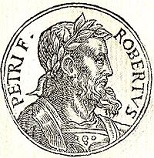
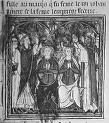
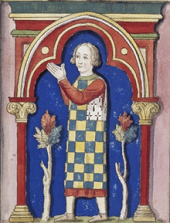

1221 On Mar. 25 after his older brother Marquis Philip of Namur renounces the succession, Robert of Courtenay (-1228), younger son of Peter II of Courtenay and Yolanda of Flanders becomes Robert I, Latin emperor of Constantinople (until 1228), immediately appealing for help from Pope Honorius III and Philip II of France, who send little aid. In May the Jokyu Incident in Japan sees retired emperor Go-Toba (b. 1180) attempt to seize power from the Kamakura shogunate and their Hojo regents, deposing his son, emperor (since Dec. 12, 1210) Juntoku (1197-1242) in favor of Juntoku's 4-y.-o. son Chukyo (1218-34), who becomes Japanese Yamato emperor #85 (until July 29); too bad, he loses, causing Chukyo to be forced to abdicate on July 29 after 2 mo. in favor of his 1st cousin (once removed) (nephew of Go-Toba) Go-Horikawa (1212-34), who on July 29 becomes Japanese Yamato emperor #86 (until Nov. 17, 1232); Juntoku is sent to exile on Sado Island for life. In June after returning from a police action in the NW Highlands, Alexander II of Scotland marries Joanna (1210-38), sister of Henry III, which he counts as a big V because his daddy was only permitted to marry the daughter of an English vicomte (below count or earl and above baron); he then asks the papal legate to Scotland to anoint and crown him like is done to "real" English and French kings, but Pope Honorius III, under English pressure, rejects it, and he keeps trying for years; in the summer the MacRuairidh clan, descendants of Somerled of Argyll revolt, causing Alexander to launch a naval campaign against them. In July after HRE Frederick II doesn't show up and Jerusalem king (1210-25) John of Brienne (1170-1237) returns to Damietta, the don't-you-just-love-Mondays Crusaders attempt to march on Cairo, but are blocked both ways and trapped by a flood of the Nile River, and after their supplies run out they they are ambushed in a night attack by al-Kamil, causing Pelagius to surrender the army and agree to an 8-year truce in the Treaty of 1221; Damietta in N Egypt is lost to the cross-kissers, and they retreat with their crosses dangling between their legs, ending the Forked Over Fifth Crusade (begun 1217); al-Kamil promises to return the True Cross, which it later turns out he doesn't have; English Magna Charta baron Robert Fitzwalter, who participated in the siege of Damietta returns to England, where he makes up with Henry III. On Oct. 21 Alix of Thouars (b. 1201) dies in childbirth, and her son John I (the Red) (1217-86) becomes duke of Brittany (until Oct. 8, 1286), with his father Peter I de Dreux Peter Mauclerc) (1190-1250) as regent (until 1237). Vienna is awarded official city status. After a long siege, the Mongols under Genghis Khan capture Nishapur, killing all except 400 artisans, who are sent to Mongolia, with the heads piled in a giant pyramid; he then captures and destroys Rayy, known for its 3K mosques and pottery kilns, massacring the entire pop.; after gathering a new army of Turks, Kwarezm shah Jalal ad-Din is defeated in the Battle of the Indus River in modern-day Pakistan, and flees to Delhi, after which Genghis punishes Herat for rebelling against their Mongol governor, massacring 60K, ending the Khwarezm-Shah Dynasty (founded 1156); Genghis sends his gens. Chepe and Subotai on a recon mission with 20K horsemen through the whole of Persia, the Caucasus, the Carpathians, and into Russia, where by 1223 they virtually obliterate a Russian army of 80K; Genghis Khan spares N Persia, putting it under Mongol viceroys; after each battle each Mongol soldier is assigned to kill 50 captives with a battle axe and collect the right ears in sacks for counting; "They had trampled on the nations which opposed their passage, penetrated through the gates of Derbent, traversed the Volga and the desert, and accomplished the circuit of the Caspian Sea, by an expedition which had never been attempted, and has never been repeated" - Edward Gibbon, Ch. 64; apocalyptic rumors of Mongolian hordes travel as far as Britain and France. Pandulph ceases to be papal legate to England; Hubert de Burgh, backed by Stephen Langton becomes leader of the king's council, causing Poitevin Frenchman Peter des Roches to step back from his efforts to control affairs. The Bohemian clergy win their war with Ottokar I, and gain almost complete independence. The Bishop of Acre reports to Rome that King David of India (Genghis Khan?) is alleged to be the grandson of Prester John. Hungarian princess (St.) Elizabeth (1207-31) (daughter of Andras II) marries Louis IV, Landgrave of Thuringia (1200-27), and after Franciscan monks teach her about St. Francis of Assisi in 1223 she begins caring so much for the poor and sick that her hubby gets jealous until he catches her carrying a basket of food and forces her to show him its contents, which are miraculously transformed into roses, causing him to beg her for forgiveness? The Third Order of Franciscans (for laymen) is founded - St. Elizabeth coming up? Grand Prince Yuri II of Vladimir founds the town of Nizhni (Nizhny) Novgorod ("new Novgorod") (modern pop. 1.5M) (renamed Gorky or Gorki during the Soviet era) at the confluence of the Volga and Oka Rivers to guard against invasions; it is surrounded by a moat and has a wooden Kremlin. Architecture: On July 20 the Gothic Burgos Cathedral in Spain, ordered by Fernando III and Bishop Don Muaricio is begun (finished 1567). Births: French queen consort (1234-70) Margaret of Provence (d. 1295) in spring in Forcalquier; eldest daughter of Count Ramon Berenguer IV of Provence and Beatrice of Savoy; wife (1234-70) of Louis IX (1214-70). Spanish Castilian king (1252-84) Alfonso (Alphonso) (Alphonse) (Alfons) X (the Wise) (d. 1284) on Nov. 23 in Toledo. Greek emperor of Nicaea (1254-8) Theodore II Ducas Lascaris (Doukas Laskaris) (d. 1258); only son of John II Doukas Vatatzes (1192-1254) and Irene Laskarina (daughter of Theodore I Laskaris and Anna Angelina, daughter of Alexios III Angelos). Italian Franciscan theologian (cardinal bishop of Albano) ("Seraphic Doctor") (St.) Bonaventura (Bonaventure) (Giovanni di Fidanza) (d. 1274) in Bagnoregio (near Viterbo); canonized in 1482; declared doctor of the Church in 1588; feast day: July 14. Deaths: Persian Sufi poet Farid al-Din Attar (b. 1145) in Khurasan - his soul now progresses from this world to the next? Uzbekistani Sufi leader Shaykh Najm al-Din Kubra (b. 1145) in Khorezm; martyred during the Mongol invasion; the Kubrawiyya Sufi order is later named after him by Ahmad Simnani (1261-1336); his mausoleum is located near Kunya Urgench. Spanish Dominican Order founder St. Dominic (b. 1170) in Bologna: "It is not by the display of power and pomp, not by cavalcades of retainers and richly houseled palfreys, nor by gorgeous apparel, that the heretics win proselytes; it is by zealous preaching, by apostolic humility, by austerity, by holiness." French duchess of Brittany (1206-21) Alix of Thouars (b. 1201) on Oct. 21.

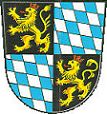
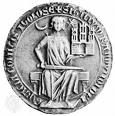

1222 On Apr. 23 on the orders of the Council of Oxford, the Feast of St. George begins to be celebrated as a nat. English festival. In the summer Scottish king Alexander II mounts another naval campaign against the MacRuairidhs; in the fall his agent Bishop Adam of Caithness is murdered by rebels, causing him to lead an army to punish them. Returning from the Crusades, Andras II of Hungary is forced by his lesser nobility (gentry) and his son Bela IV to issue the Golden Bull (Seal), the Magna Charta of Hungary, limiting the king's absolute power of imprisonment and confiscation, with an annual assembly to present grievances; it also exempts the gentry and clergy from taxation, while excluding Jews and foreigners from land and offices. On Aug. 2 Raymond VI, Count of Toulouse (b. 1156) dies, and is succeeded by his son Raymond VII (1197-1249) (until Sept. 27, 1249). In Aug. Theodore I Lascaris dies, and on Dec. 15 his son-in-law John III Ducas (Doukas) Vatatzes (1193-1254) becomes emperor of Nicaea (until Nov. 3, 1254), proving a great general and ruler, bringing his empire peace and prosperity - a better mouth, guaranteed? Prince Yaroslav of Novgorod overruns Estonia and sieges its capital Kolyvan. 16-y.-o. Wittelsbach duke Otto II of Bavaria (1206-53) marries Aganes, granddaughter of Duke Henry the Lion and Conrad of Hohenstaufen, making the Palatinate of the Rhine a Wittelsbach possession (until 1918), and causing the lion to be put in their coat of arms. Patna, India becomes a Nestorian metropolitan see. Stephen Langton issues the Constitutions, the Magna Charta of the English church. Stephen II Nemanjic of Serbia is recrowned by his Greek Orthodox brother St. Sava with a crown from the Greek patriarch of Nicaea in order to take away any taint of Roman Catholicism. The Rebellion of the Sinclairs sees the Sinclair family in Scotland try to rid Caithness of their enemies the Sutherland clan and their puppet bishop in Dornoch, inciting a riot which gets the bishop burned alive and the cathedral burned down, after which the king backs the Sutherlands in burning Wick and Thurso and capturing 80 ringleaders, who are tried in Golspie, four of them being burned alive then fed to the dogs. Deacon ? is burned at the stake for heresy for converting to Judaism to marry a Jewess, becoming the first known burning at the stake in England. Science: Jordanus Nemorarius (Jordanus de Nemore) (Giordano of Nemi) becomes gen. #2 of the Dominican Order, going on to dabble in science, using Hindu numerals and doing algebra with letters, writing Elementa Super Demonstrationem Ponderis, discussing the component of gravity along a trajectory, and expounding Jordanus' Axiom, that a force that can raise weight W to height H can raise weight K*W to height H/K; he also writes De Ratione Ponderis, discussing statical moments (the product of force and a lever arm), and The School of Jordanus, discussing the theory of virtual displacements. Nonfiction: Snorri Sturluson (1178-1241), Prose (Younger) Edd (Norse "great-grandmother"); treatise on Norse mythology and poetry; Heimskringla; a history of the Norwegian royal family from the time of the descent of the Ynglings from the Norse gods until 1177; Harald's Saga; about Harald Hardrada's defeat in England in 1066 - is that like Sleepy or Sneezy? Births: English knight Richard, 5th Earl of Hertford, 6th Earl of Glouchester, 2nd Lord of Glamorgan, 8th Lord of Clare (d. 1262); on Aug. 4 in Clare Castle, Clare, Suffolk; son of Gilbert de Clare, 4th earl of Hertford (1180-1230) and Isabel Marshall (1206-40); father of Gilbert "the Red Earl" de Clare (1243-95). Deaths: French count of Toulouse (1194-1222) Raymond VI (b. 1156) on Aug. 2.


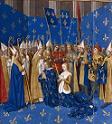

1223 On Jan. 18 Georgian king (since 1213) (son of Tamar) George IV Lasha (b. 1191) dies after repulsing Mongol attacks in 1221-2, and his sister Rusudan (1194-1245) becomes queen of Georgia (until 1245), facing more attacks by Mongols. On Mar. 25 king (since Mar. 26, 1211) Afonso II (b. 1185) dies, and on Mar. 26 his eldest surviving son (by Urraca of Castile) Sancho II (1209-48) becomes king #4 of Portugal (until Dec. 4, 1247), going on to relinquish a huge number of privileges to the Church to gets its independence recognized, creating a state within a state, after which he tries to weaken its power and funnel its revenues to the state, pissing-off Pope Honorius III, who excommunicates him. In Apr. Genghis Khan sends 10 ambassadors to Russian grand prince of Kiev (since 1212) Mystislav III Romanovich the Old (b. ?), who has them summarily executed, pissing-off the Mongols, who under Subitai invade S Russia from the Transcaucasus region, and defeat a coalition of Russians and Cumans at the Battle of the Kalka River in modern-day Donetsk Oblast, Ukraine near the Sea of Azov, capturing Mystislav III; "At the end of the campaign, Subodei and Jebe led their soldiers down to spend a relaxing spring in the Crimea on the Black Sea. They celebrated their victory with a great drunken party that lasted for days. The guest of honor was the defeated Prince Mstislav and his two sons-in-law, but their treatment showed how much the Mongols had changed since the time of Genghis Khan. The Mongols wrapped the three of them in felt rugs, as befitted high-ranking aristocrats, and stuffed them beneath the floorboards of their ger, thereby slowly, but bloodlessly, crushing the men as the Mongols drank and sang through the night on the floor above them. It was important to the Mongols that the Russians understand the severe penalty for killing ambassadors, and it was equally as important for the Mongol leaders to reaffirm to their own men the extent to which they would always be willing to go to avenge the unjust killing of a Mongol." On July 14 French king (since Sept. 18, 1180) Philip II Augustus (b. 1180) dies, leaving a legacy as the #1 Euro monarch of the day, with his well-embellished and well-walled Paris as the undisputed cultural capital of W Europe, and on Aug. 6 his 36-y.-o. son Louis VIII the Lion (Coeur de Lion) (1187-1226) is crowned Capetian king #8 of France in Reims (until Nov. 8, 1226), becoming the first Capetian king not crowned in his daddy's lifetime; too bad, he breaks the mold a 2nd time with a pathetically short reign. On Dec. 25 St. Francis of Assisi makes the first Christmas Creche (Nativity crib scene) with an ox and ass in Greccio, Italy. After a dispute of Philip of Ibelin, Alice of Champagne leaves Cyprus while remaining regent for her son Henry I, going on to unsuccessfully claim the kingdom of Jerusalem against the infant Conrad (son of her niece Isabella II of Jerusalem and HRE Frederick II). The Mongols under Subitai invade S Russia from the Transcaucasus region, and defeat a coalition of Russians and Cumans at the Battle of the Kalka River near the Sea of Azov. Pope Honorius III honoriously declares Henry III of age, but he continues in tutelage for the greater part of his official acts. Valdemar II of Denmark is captured by his vassal the Count of Schwerin, who releases him in 1226 only after he gives up most of his conquests in N Germany - and they still call him the Victorious and the Conqeror? The first mention is made of the ferret in Britain; rabbits were introduced by the Normans in the late 11th cent. Births: Egyptian Mamluk Bahri sultan #1 (1260-77) Al-Zahir al-Malik Baybars (Baibars) (Arab. "panther") (d. 1277) AKA Abu al-Futuh (Abu l-Futuhat) (Arab. "father of conquest") on July 19 in Cumania. Greek Byzantine emperor (1261-82) Michael VIII Palaeologus (Palaiologos) (d. 1281); founder of the Palaeologan Dynasty (ends 1453); son of Andronikos Doukas Komnenos Palaiologos and Theodora Angelina Palaiologina (granddaughter of Alexius III). Welsh prince (last) Llywelyn ap Gruffydd (Ein Llyw Olaf) (Our Last Leader) (d. 1282); son of Gruffydd ap Llywelyn (1200-44) and Senana; nephew of Dafydd ap Llywelyn (1208-46); grandson of Llywelyn the Great (1173-1240). Deaths: Welsh world traveler Giraldus Cambrensis (b. 1147); leaves four books on Ireland and Wales. French king (1180-1223) Philip II Augustus (b. 1180) on July 14. Portuguese king (1211-23) Afonso II (b. 1185) on Mar. 23 in Coimbra. Georgian king (1213-23) George IV Lasha (b. 1191) on Jan. 18.


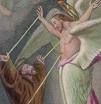

1224 On June 5 HRE Frederick II ("Grand Frederigo") founds the U. of Naples Federico II, becoming the oldest public non-religious univ. on Earth, dedicated to training secular admin. staff; alumni incl. St. Thomas Aquinas. Henry VII proclaims the Public Peace (Treuga Henrici) in Wurzburg. Louis VIII seizes Poitou, Saintonge, and all the lands between the Loire and the Garonne Rivers in an attempt to destroy the Angevin Dynasty's power, but the latter ain't dead yet and fights back. Theodore Dukas Angelus of Epirus captures Thessalonica and ends the Latin kingdom of Thessalonica (founded 1204), then proclaims himself Emperor of the West, going on to conquer Philippopolis and Andrianople; meanwhile John III Vatatzes of Nicaea defeats the Franks at the Battle of Poimanenon, then takes the islands of Samos, Chios, and Lemnos off the Anatolian coast, followed by Rhodes, and sends an army across the straits to capture Adrianople; meanwhile Robert I of Courtenay, Latin emperor of Constantinople is defeated by Theodore Dukas Angelus of Epirus at the Second Battle of Serres in Greece (first in 1196), after which he drives the invading Nicaeans away from Adrianople; when the dust settles Robert's territories are reduced to the city of Constantinople alone. Lucky Ivan? Mongol hordes invade Poland, Hungary, and Russia as far as Novgorod, but upon hearing that the Tanguts have rebelled, Genghis Khan returns E to Karakorum to deal with them. Song Ning Zong (b. 1168) dies without an heir, and Song Li Zong (Lizong) (Zhao Yun) (1205-64), who was not in line for the throne but was shoed-in by chancellor (1208-33) Shi Miyuan (1164-1233) and dowager empress Yang becomes Southern (Nan) Song emperor #5 of China (until Nov. 16, 1205), going on to rule for 40 years while spending his time chasing hos and dying without an heir. Frederick II orders all heretics in Lombardy to be burned at the stake; Count Ugolini, papal legate to Lombardy approves and pub. it. Irish king of Connacht (since 1202) Cathal Crobhdearg Ua Conchobair (Cathal the Red-handed O'Conor) (O'Connor) (b. 1153) dies after writing to Lord of Ireland Henry II requesting his son Aedh (Od) be his successor, and in 1226 the Irish kingdom of Connacht is declared forfeit by the English govt., causing a 9-year war, starting next year with an invasion by Domnall Og O Neill of Tir Eogain, who declares himself king and causes several of his chieftains (Siol Muiredaig) to defect, causing Cathal to appeal to a council of English chiefs in Ireland successfully, who back him in a brutal war that devastates Connacht, with major battles in Turlough, County Mayo and Meelick in County Galway, and the plundering of Coolcarney, which results in fishing baskets full of drowned children; after peace is restored, his chiefs are held for ransom by the English, and when they finaly leave, the sons of Ruaidri O'Connor revolt, resulting in 1225 in the Sack of Ardrahan, in which Niall, son of Farrell O'Teige is KIA; in 1228 Connacht king Aedh is KIA, and his cousin Aedh mac Ruaidri Ó Conchobair (-1233) becomes king of Connacht (until 1233); in 1226 Cathal's chief bodyguard Fearghal Ó Taidg an Teaghlaigh (-1226) is KIA by Donslevy O'Gara in County Sligo; in 1232 a truce is declared, after which "This was a necessary tranquility, for there was not a church or territory in Connaught at that time that had not been plundered and desolated. An oppressive malady raged in the province of Connaught at this time: it was a heavy burning sickness, which left the large towns desolate, without a single survivor"; too bad, the English allied with the French see their chance and invade, conquering Connacht by 1235. The Order of Calatrava in Portugal moves to Aviz (Avis) and becomes the Military Order of Aviz. (St.) Francis of Assisi (1181-1226) gets his lucky stigmata in his hands, putting him on the fast track for sainthood, which is helped by his animal stories, esp. The Wolf of Gubbio; the Franciscan Order reaches England, soon attracting the greatest scholars at Oxford. The Transylvanian Saxons in Hungary are given self-govt. with a written charter. Venetian glassmakers form a craft guild. Nonfiction: Abdallah ur-Rumi (1179-1229), Mu'jam ul-Buldan (1224-8); geographical lit. encyclopedia. Births: French "Life of St. Louis" historian Jean de Joinville (d. 1317) on May 1 in Champagne; takes part in the Seventh Crusade (1248-54).

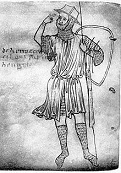
1225 In the fall Georgia is attacked by the Khwarezmians under shah Jelal ad-Din Mingburnu, who is being pursued by the Mongols, who defeat the Georgians in the Battle of Garni and siege Tbilisi (until 1226), causing Queen Rusudan to move the capital to Kutaisi on the Rioni River 137 mi. W of Tbilisi in the W region of Imereti. On Oct. 5 caliph (since Mar. 28, 1180) An-Nasir (b. 1158) dies, and Al-Zahir (Al-Dhahir) (1175-1226) succeeds him as Abbasid caliph (until July 10, 1226). The English regain all of the Frenh lands lost the previous year except Poitou, the Limousin, and Perigord. After being issued in 1215 and reissued in 1217 and 1217, the Magna Charta is reissued for the 3rd time in a definitive form. HRE Frederick II marries Yolande, heiress of the Latin kingdom of Jerusalem, then declares himself king of Jerusalem, forcing John of Brienne, who is traveling on the Continent to relinquish the title, while he soon commands papal troops in an attack upon Frederick II's possessions; 8-y.-o. Henry I is hastily crowned king of Cyprus in Nicosia to avert a seizure of power by Frederick II; John of Brienne's daughter Isabella is crowned queen of Tyre. "Red" Gilbert de Clare, 7th Earl of Hertford and 3rd Earl of Gloucester (1243-95) inherits his father's and his grandmother's estates, making him the most powerful magnate in England. The German Brethren of the Sword capture Tartu, which becomes a bishropric. Otto de la Roche resigns, and his son Guy I de la Roche (1205-63) becomes Latin duke #2 of Athens (until 1234). The Ly Dynasty in Vietnam ends, and the Tran Dynasty (ends 1400) is founded by the last queen of Ly, from the Tran family of pious Buddhists, who institute a classical Chinese Confucian educational system and compulsory military service. The Council of Sens condemns the 870 pantheistic work "De Divisione Naturae" of Johannes Scotus Erigena, and Pope Honorius III orders it burned. When the job of Messiah stays open and another claimant appears in S Arabia, Maimonides writes Letter to the South, pooh-poohing him while keeping belief in a coming Jewish Messiah as one of the 13 principal tenets of the Jewish faith. The first European guilds and fraternities come into existence. About this time cotton is grown in Spain. Science: Italian mathematician Leonardo Fibonacci (1170-1250) pub. two works contributing to the solution of equations of the first and second degree, and competes in a math tournament with John of Palermo supervised by HRE Frederick II. Nonfiction: About this time (1225-35) Villard de Honnecourt flourishes in Picardy, N France, leaving a sketchbook containing 250 drawings, mostly architectural designs of churches he visited, incl. Laon Cathedral and Rheims Cathedral. Chinese customs inspector Zhao Rugua (1170-1228) writes Description of the Barbarous Peoples (Zhufan Zhi) (Chu-fan-chi), describing the Lighthouse of Alexandria, and a compass needle mounted on a dry pivot. Music: The earliest known English round (song in harmony) Sumer Is Icumen In is composed by John of Foresete, a monk of Reading Abbey, with the 2nd line "Lhude sing cuccul" giving it the name "The Cuckoo Song"; he also writes the first vocal composition that can be read and played by modern musicians. Poetry: Guillaume de Lorris (-1235) and Jean de Meung, Roman de la Rose; a romantic tale of courtly wooing in 22K lines of verse, the first 4K written by de Lorris. Births: Italian "Summa Theologica" Dominican scholastic philosopher-theologian (blonde) ("Angelic Doctor") ("Prince of Scholastics") ("the Great Dumb Ox of Sicily") (St.) Thomas Aquinas (Thomas of Aquino) (d. 1274) in Roccasecca (3 mi. from Aquino) (halfway between Rome and Naples, near Monte Cassino); son of Count Landulf of Aquino (nephew of Frederick I Barbarossa); mother is a descendant of the Norman princes of Sicily; brother Rainaldo is a page-falconer at the court of Frederick II; pupil of Albertus Magnus; educated at the Benedictine monastery of Monte Cassino, and the U. of Naples, where he is introduced to Aristotle and Averroes; father of Roman Catholic theology, saving it after Western contact with the disturbing works of Aristotle; canonized in 1323; proclaimed doctor of the Church in 1567. German #1 poet Konrad (Conrad) von Wurzburg (Würzburg) (d. 1287) in Wurzburg; settles in Basel in 1270; writes short Middle High German court epics based on Latin and French sources, marking the transition from the Minnesinger to the Meistersinger period. Georgian Bagrationi king (1259-93) David VI Narin (the Clever) (d. 1293); son of Rusudan (1194-1245) and Muhammad Mughis ud-din Turkan Shah (grandson of Kilij Arslan II) (who converted to Christianity after his marriage). Deaths: Arab Abbasid caliph (1180-1225) Al-Nasir (b. 1158) on Oct. 5.
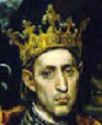


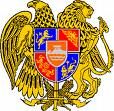
1226 On Jan. 30 Pope Honorius III approves the mendicant Carmelite Order (founded in 1224), and induces French king Louis VIII (b. 1187) to crusade against the remaining Albigenses, and he conquers Avignon in Provence, then most of Languedoc, starting the practice of bestowing huge fiefs as appanages on princes of the blood, which later backfires in Burgundy and elsewhere; he then dies on Nov. 8 of dysentery on his return to Paris, and his able, carefully-educated Capetian son Louis IX (the Saint) (1214-70) (canonized in 1297) (the ideal medieval king?) succeeds him as Capetian king #9 (until Aug. 25, 1270), with his mother Blanche of Castile (1188-1252) as regent, going on to continue his daddy's policy of enlarging the French royal domain and getting brownie points with the Church by kicking any remaining Albigensian butt around the Mediterranean, and introducing the title of admiral into France while winning a rep. for justice which makes him the arbiter of Europe, and his reign the golden age of medieval France; in the meantime his devout mouther, er, mother gets the support of the people, officials, and Church to suppress a number of feudal rebellions (1226-31) while he finished growing up, wearing the saint-making itchy-scratchy goat-hair shirt. On Mar. 9 the Khwarezmians take Tbilisi after killing 100K, and the remaining pop. are ordered to convert to Islam, which they refuse, causing them all to be massacred. Duke Conrad of Masovia (Poland) invites the Palestine-based Teutonic Order (Knights) into Poland to help them fight the pagan Prussians; initially claiming to want to stay only a year or two, they instead conquer most of the Baltic coast within the next two cents., blocking Polish access to the sea. Robert of Courteney, Latin emperor of Constantinople is defeated by Theodore of Epirus and John III of Nicea, causing him to promise to marry Eudoxia, daughter of late Nicaean emperor Theodore I Lascaris, but since his sister Marie de Courtenay was his wife, Patriarch Manual Sarantenos prohibits the marriage, causing him to switch to the Lady of Neuville (-1228) (Eudoxia?), pissing-off a Burgundian gentleman, who organizes a conspiracy of knights in Constantinople to attack the house of the new wife and her mother, cutting off their lips and nostrils and throwing them in the sea, causing Robert to flee to Rome to obtain assistance from Pope Gregory IX, after which he falls sick and dies in 1228 in Morea during the return visit at the court of Geoffrey I of Villehardouin, prince of Achaea. Hetum (Hethum) (Hethoum) (Hetoum) (Het'um) (Hayton) I the Great (1213-70) becomes ruler of Christian Lesser Armenia (Cilicia) (until 1270), founding the Hetoumid Dynasty (ends 1342), going on to fight the pesky Mongols and Muslims. Az-Zahir dies, and his son Al-Mustansir (1176-1242) succeeds him as Abbassid caliph in Baghdad (until 1242). Fujiwara no Yoritsune (Kujo Yoritsune) (1218-56) becomes Kamakura shogun #4 of Japan (until 1244). Ezzelino III da Romano (1194-1259) of Treviso (modern-day Veneto) is elected podesta of Verona, Italy, ruling Verona, Vicenza, and Padua for almost two decades, converting the office into a permanent lordship and becoming a cruel tyant propagandized against heavily by many enemies. Prince Yaroslav of Novgorod invades and devastates Finland, and forcibly baptizes the Karelians; he then fails to talk his people into making war with its neighbor Pskov, pisking him off and causing him to seize the Novgorodian enclave of Volokolamsk (Russ. "portage on the Lama") at the confluence of the Lama and Gorodenka Rivers (80 mi. NW of Moscow). Big mistake? Roman Catholics begin to bow down before the bread at Mass - look what it did to that wolf at Gubbio? Architecture: Toledo Cathedral in Spain is begun (finished 1493). Births: French count of Anjou and Provence, and king of Sicily (1266-85) Charles I of Naples and Sicily (Anjou) (d. 1285) on Mar. 21; youngest son of Louis VIII (1187-1226) and Blanche of Castile (1188-1252); younger brother of Louis IX. Polish king (1227-79) Boleslaus (Boleslav) (Boleslaw) V (the Chaste) (the Bashful) (d. 1279) on June 21 in Stary Korczyn; son of Leszek the White. Dutch count of Flanders (1246-1305) Guy of Dampierre (d. 1305); 2nd son of William of Dampierre (1196-1231) and Margaret II of Flanders (1202-80). Syrian bishop and philosopher-theologian-historian-lexicographer Gregory Bar Hebraeus (d. 1286) in Ebro. Deaths: Italian Roman Catholic friar St. Francis of Assisi (b. 1182) on Oct. 3 in Porziuncola, Assisi; a cent. later the anon. The Little Flowers of St. Francis spreads folk tales and anecdotes about him, along with his sermons, incl. Sermon to the Birds. French king (1223-6) Louis VIII the Lion (b. 1187) on Nov. 8 in Chateau Montpensier (dysentery). Irish musician Aed mac Donn Ó Sochlachain (b. ?); one of the first known Irish musicians, known for chanting and harp-playing.







1227 In Feb. the Georgians recapture Tbilisi, but have to abandon it again, and burn it in the battle. On Mar. 18 Pope (since 1216) Honorius III dies, and Count Ugolino of Segni (nephew of Pope Innocent III) is elected Pope (#177) Gregory IX (1145-1241), continuing his uncle's policy of papal supremacy, and renewing the prohibition against usury, which becomes the law of the Church until 1917; he immediately orders HRE Frederick II to obey his 1215 vow to sail for the Holy Land, which he promises to do on Sept. 8, but reneges three days later, claiming sickness (fever), and on Sept. 20 Gregory IX places him under the ban of the Church (excommunication), and pub. a Letter Contra HRE Frederick II denouncing his vices, heresies, and offences against mankind in an attempt to reel the imperial religious skeptic in and make him follow his daddy Henry VI's footsteps; not phased, Frederick II counters with his own Letter Contra Pope Gregory IX, addressed to all the princes of Europe, becoming the first clear statement that the pope shouldn't be able to tell secular rulers what to do. On July 22 after Valdemar II invades N Germany to get his lost territories back and attacks Lubeck (Lübeck)in Schleswig-Holstein, he is disastrously defeated in the Battle of Bornhoved (Bornhöved), ending Danish domination of the S Baltic Sea, although he keeps Estonia; Lubeck is declared a free imperial city by HRE Frederick II, and goes on to glory as a German outpost in the Baltic against the Danes. On Aug. 18 after conquering the Western Xia (Xia Xia) (Hsi-Hsia) (Tangut) state in C China (founded in 1038), Genghis Khan (b. 1162) dies near Khentii Aimag in Yinchuan, Western Xia after conquering 4.86M sq. mi. from the Pacific Ocean to the Caspian Sea (incl. N China, Mongolia, S Siberia, and C Asia), and is succeeded by his 3rd son Ogedei (Ogodei) (Ogadai) (Ogotai) (Ughetai) (1186-1241). The great council of England formally declares Henry III to be of the age of majority, but he continues to leave the govt. to Hubert de Burgh, who is elevated to earl of Kent; meanwhile Henry III seizes Isleworth in NW London near the Thames River, along with other properties of the St. Valeri family and gives it to his brother Richard, 1st earl of Cornwall, who builds a manor house that is burned down during the Second Barons' War in 1264. Leszek I the White (b. 1186) is assassinated, and Duke Henry the Bearded is wounded in Gasawa while attending a diet of Piast Polish dukes on the orders of Prince Swietopelk II of Gdansk Pomerania, and Leszek I's 6-y.-o. son Boleslav (Boleslaus) (Boleslaw) V (the Chaste) (the Bashful) (1226-79) is too young to succeed, allowing his gay cousin Wladyslaw (Wladislaus) III Spindleshanks (1165-1231) to regain his throne in Cracow after waiting 20 fun-filled years; too bad, he is deposed next year by his nephew Wladyslaw Odonic Plwacz (1190-1239) (father of Przemysl I) (who was behind Leszek I's assassination), who becomes grand duke of Poland (until 1234). The first European Medieval gay knight orgy or what? Austrian married knight Ulrich von Lichtenstein (1200-75) dresses in a white ballgown wearing braided hair tresses as Frau Venus, and challenges all the knights of Europe to joust with him, shattering an avg. of 8 lances a day for 5 weeks and winning 307 jousts, never being unhorsed?; all this to get the permission of his lady love (a highborn married princess) to kiss him? On Sept. 11 St. Elizabeth's hubby Louis IV (b. 1200) dies in Otranto of fever en route to join the Sixth Crusade, causing her to utter the soundbyte: "He is dead, he is dead. It is to me as if the whole world died today"; their boy son Hermann II (1222-41) becomes landgrave of Thuringia, with Ludwig IV's grasping brother Henry Raspe as regent; after joining the third order of St. Francis under her strict confessor Konrad (Conrad) of Marburg (-1233) (later anti-Albigensian inquisitor), Elizabeth begins giving away her estate as alms, causing her brother-in-law Henry Raspe to go nonlinear and drive her and her three children from Thuringia, and she takes refuge with her maternal uncle Bishop of Bamberg (1203-37) Count Egbert (Ekbert) von Andechs-Meranien (1173-1237) in Pottstein, Bavaria (either that or Egbert held her hostage to make her give up her vow of celibacy so she could marry into more bling, and she is released after threatening to cut off her own nose), then moves to Marburg, where she ministers to the sick and dies at age 24 in 1231, getting sainted only four years later. Japanese potter Kato Shirozaemon (Toshiro) returns from a 4-year stay in China to found the Japanese porcelain industry in Seto. Births: Italian pope (1288-92) (first Franciscan) Nicholas (Nicholaus) IV (Girolamo Masci) (d. 1292) on Sept. 30 in Lisciano, Marche. Deaths: Norman duke William of Apulia (b. 1111). Chinese Daoist monk Changchun (b. 1148). Mongol conqueror Genghis Khan (b. 1162) on Aug. 18 near Khentii Aimag; dies in bed after enjoying 500 wives and concubines; his burial party kills anybody seeing the procession, and all slaves and solders attending it are killed; a river is diverted over his grave, which isn't found until ?; his palace is uncovered in 2004. Polish grand duke (1194-1227) Leszek I the White (b. 1186). German landgrave of Thuringia (1217-27) Ludwig IV (b. 1200) on Sept. 11 in Otranto (fever).


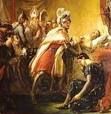

1228 On Mar. 23, 1228 Pope Gregory IX renews the excommunication of double-shuffling wannabe HRE (since Nov. 22, 1220) Frederick II Hohenstaufen (1194-1250) and proclaims a Crusade against his Sicilian lands, then is publicly insulted by a Ghibelline mob, causing him to pick up his holy robes and flee to Perugia, from where he directs an invasion of Apulia (ends 1229); on June 28 Frederick II finally sails for the Holy Land to lead the lay-royal Sixth (6th) Crusade (ends 1229), assisted by wealthy Richard of Cornwall, 1st Earl of Cornwall (1209-72) and Count Thibaud (Theobald) IV (the Troubadour) (the Posthumous) de Champagne (Navarre) (1201-53), but this only causes the pope to ban him a 2nd time; on July 21 he lands at Limassol, engages in a power play with John of Ibelin, the Old Lord of Beirut, sails for Acre, then goes to Jaffa where he holds truce conferences with Egyptian sultan Malik al-Kamil, nephew of Saladin exposing his soft stance on Islam, helped by being fluent in Arabic; ; Stupor Mundi (Wonder of the World) Frederick II speaks six languages fluently, incl. Arabic, making him the first Crusader to speak dangerous Muslim talk, causing rumors that he might be the Antichrist. On Aug. 14 Pope Gregory IX canonizes St. Francis of Assisi - I see, I see? On Sept. 24 Stefan II the First-Crowned dies after being tonsured as monk Simon, and his blind eldest son Stefan Radoslav (1192-1234) becomes king #2 of Serbia (until 1233), relying on his father-in-law Theodore Komenos Doukas (-1230) of Epirus. Loser Robert I of Courteney, Latin emperor of Constantinople since 1218 dies, and is succeeded by his 11-y.-o. brother (by Peter I and Yolande) Baldwin II of Courtenay (1217-73), who becomes the last Latin emperor of Constantinople (until 1261); his youth causes antsy Frankish nobles in Constantinople to propose Bulgarian tsar John Asen II (-1241) as emperor to counter the aggression of Theodore Dukas Angelus of Epirus, but the Roman Catholic clergy nix it by 1230; he spends his reign peddling holy relics looted from Big C throughout Europe - the Devil wears Prada? Henry the Bearded (1163-1238) becomes prince of Cracow, and fights to reunify Poland; meanwhile the Teutonic Knights arrive in Prussia. Another Scottish rising in the N is crushed by Alexander II. The Genghis-less Mongols defeat the Russians, but fail to consolidate their gains. The Khwarezmians defeat the Georgians in the Battle of Bolnisi despite Queen Rusudan's alliance with the neighboring Seljuk rulers of Rum and Khlat, whose forces arrive too late. The Tai Ahom Kingdom in the Brahmaputra Valley in Assam, NE India is founded by a Tai prince from Mong Mao (ends 1826). Gilbert de Clare, earl of Gloucester (husband of William the Marshall's daughter) leads an army against the pesky Welsh, and captures Morgan Gam, then releases him next year. The town of Metlika ("goosefoot") in SE Slovenia is first mentioned. The world's first publicly-funded univ. is founded in Vercelli, Italy in Piedmont, N Italy; closed in 1372. Nonfiction: Leonardo Fibonacci (1170-1250), Liber Abaci; the only ed. that survives to modern times; pub. in English for the first time in 2002. Births: German king (1247-56) and count of Holland and Zeeland (1235-56) William II of Holland (d. 1256) in Feb.; son of Floris IV (1210-34) and Mathilde of Brabant. German Hohenstaufen king (1237-54) and Sicily king (1250-54) and king of Jerusalem (1228-54) Conrad IV (d. 1254) on Apr. 25 in Andria; son of HRE Frederick II (1194-1250) and 14-y.-o. harem bride Yolande II of Brienne (1212-28), who dies in childbirth like her mommy Mary de Montferrat of Jerusalem (1191-1212); half-brother of Manfred (1232-66). Deaths: English archbishop of Canterbury Stephen Langton (b. 1156) on July 9. Flemish Latin emperor of Constantinople (1221-8) Robert I of Courtenay (b. ?) in Morea.
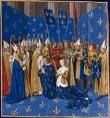


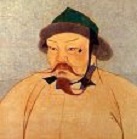

1229 On Feb. 14 after years of feeling cheated out of the throne, Olaf II (the Black) Godredsson (1173-1237) kills his younger brother Ragnald IV, and becomes king of the Isle of Man (until 1237). On Feb. 18 the Crusaders under cool multilingual brain man HRE Frederick II negotiate the Treaty of Jaffa and Tell Ajul with al-Kamil, Ayyubid sultan of Egypt, ending the Sixth Crusade (begun 1228), agreeing to a commercial convention along with the surrender to the Crusaders of part of the Kingdom of Jerusalem, incl. the complete tour package of Jerusalem, Nazareth, Bethlehem, and Lydda, along with a corridor to the sea for Christian tour groups, and a 10-year truce; since Jerusalem is wallless, neither ruler much cares?; Frederick II promises not to build the walls of Jerusalem; the Temple Mount incl. al-Aqsa Mosque and the Dome of the Rock remain in Muslim hands, along with the Crusader Oultrejordain (Transjordan) castles; the Christians retake Jerusalem until 1239, prohibiting Jews from living there; the Muslim and Christian pops. greet the news with riots, with mobs attacking al-Kamil's camp at Tel al-Ajul and having to be driven away by troops; Sheikh Sibt al-Jauzi speaks before sobbing crowds at the Great Mosque in Damascus, calling al-Kamil a traitor, which he lamely responds to by claiming he only gave up "some churches and ruined houses"; on Mar. 18 after no priest will do it, HRE Frederick II crowns himself king of Jerusalem in the Church of the Holy Sepulchre, along with his infant son Conrad IV (b. 1228), for whom he acts as regent, then tours the Temple Mount, speaking with the attendants in Arabic and beating up a Christian priest who dares to enter al-Aqsa Mosque carrying a Bible, ordering the muezzin to be allowed to issue the daily calls to prayer, pissing-off the Templers, who plot to assassinate him; actually the patriarch of Jerusalem, who opposed Frederick II at every turn to please his boss the pope ordered all clergy locked up so they couldn't help in the ceremony; hobbled by his ban he leaves in June early in the morning while the Templers pelt him with manure and entrails, then seizes Cyprus with his Longobard troops, defeats a papal army in Sicily, and makes peace overtures to try to get the ban lifted; meanwhile the pope and the emperor trade epithets, accusing each other being the Antichrist (and they're both right?); former Latin king of Jerusalem (1210-25) John of Brienne returns to Jerusalem, and is chosen by the Latin barons of Constantinople to become regent of boy emperor Baldwin II of Constantinople, then becomes emperor in 1231 until he comes of age in 1237. On Apr. 12 Raymond VII of Toulouse surrenders to 17-y.-o. Louis IX and his regent mother Blanche of Castile, and signs the Treaty of Paris (Meaux), ending the Albigensian Crusade (begun 1209), betrothing his heiress to Louis' brother Alphonse, while Louis IX is betrothed to Margaret of Provence (1221-95), marrying her on May 27, 1234, proceeding to steal Provence from the HRE; Raymond VII cedes over half of his territory to the king, retaining the remainder only during his life and agreeing to dismantle his fortifications in Toulouse et al., causing Occitan political autonomy to be kaput, and Cathars to lose their last political protection, with Raymond required to hunt them down as vassals of the king. On July 14 HRE Frederick II defeats imperial bailiffs outside Nicosia and seizes Cyprus from regent John of Ibelin (1179-1236), old Lord of Beirut, who flees with his family to Palestine and sets up shop in Jaffa, vowing to kick Hohenstaufen butt, launching the War of the Lombards (Imperialists) (Ibelin War) between the reps of HRE Fredrick II, supported by the Knights Hospitaller and Teutonic Knights vs. the native aristocrats led by Ibelins and Montforts, supported by the Knights Templar (ends 1243). On Sept. 10 James I the Conqueror of Aragon conquers Mallorca in the Balearic Islands, and sets out to conquer the rest (finished 1235). On Sept. 13 Ogedei (Ogotai) Khan (1186-1241), 3rd and favorite son of Genghis Khan becomes khan #2 of the Mongol Empire (until Dec. 11, 1241); the Mongols put an end to the sovereignty of the Uyghurs. Henry III summons his English vassals to follow him to Aquitaine to regain the N part, which has been seized by France; however, there aren't enough ships to carry the troops, and Henry blames Hubert de Burgh (who had quarreled with him over his military adventures and subservience to the papacy) for it - he's got maybe 5 years left? After becoming James I's mistress to save Urgell, Countess (since 1208) Aurembiaix (1196-1231) of Urgell in N Spain marries Infante Pedro, who becomes count Peter I of Urgell (1187-1258), exiled brother of Afonso II of Portugal, who helps her regain Urgell under Aragonese lordship in return for the city of Lleida, then helps the Bishop of Tarragona conquer Ibiza from the Moors in 1230; when she dies, James I claims his county, and in 126 he gives over the rule to the House of Cabrera and James I in return for the Balearic islands of Majorca, Ibiza, and Formentera. The Hafsid Dynasty splits from the Almohads under Abu Zakariya Yahya (1203-49), ruling Ifriqiya (Tunisia) until 1534. How do you approach the Word of God? You don't? Progresso, what a soup of holy words shouldn't be? After the first hand-copied partial translations of the Bible by the pesky Albigensians begin appearing, the (non-ecumenical?) Council of Toulouse forbids lay persons from reading the Bible, to be enforced by the Papal Inquisition, run mainly by the Dominicans (is that a Bible in your pants or are you just happy to see me?); "Search the Scriptures, for in them ye think ye have eternal life, and they are they which testify of me" (John 5:39); "Use of the vernacular [would mean] demolition of a language barrier that safeguarded the clergy's exclusive dominion over religious matters" (Massimo Firpo); meanwhile the U. of Toulouse is founded in Toulouse, France, becoming the 2nd oldest univ. in France and one of the oldest Euro univs. to survive to modern times; it is later renamed in honor of 1912 Nobel Chem. Prize winner Paul Sabatier (1854-1941). Students in Paris launch the first major student strike in history over the price of wine in a tavern in the Faubourg Saint-Marcel. King Henry III of England forces the Jews to pay half the value of their property in taxes, collecting £422K in taxes and capital levies in seven years - who chooses which half? Pope Gregory IX exacts a tithe of one-tenth of clerical incomes to pay for his war against the *!?!* emperor Fred II Is Dead. Frenchman Simon de Montfort (1208-65) comes to England to present claims to the earldom of Leicester, which he inherited from his grandmother - what's in your wallet? Geoffrey I of Villehardouin (b. 1169) dies, and his eldest son Geoffrey II of Villehardouin (1195-1246) becomes Latin prince #3 of Achaea (until May 6, 1246), becoming the most powerful vassal of the Latin Empire of Constantinople, helping the Crusader states in Greece regroup around him, going on to rescue Constantinople 3x and receiving the reward of suzerainty over Euoboea by Emperor Baldwin II, becoming known for his benevolent and just rule, keeping his popularity with the O rthodox Greco-Slavic pop. by restricting the activities of Latin priests, even after the pope excommunicates him, knowing that things are so iffy that he will reinstate him, which he does. The town of Stuttgart on the Neckar River 130 mi. SSE of Frankfurt is mentioned. About this time univs. in Italy begin the systematic training of physicians. Inventions: Fustaqiyya', a chicken-pistachio dish is served in Baghdad for the first time. Science: Morrocan Muslim scholar Hasan al-Marraqushi pub. tables of sines, versed sines, arc sines, and arc cotangents for each degree. Births: Saxon Welf duke Henry II (1142-80) and Bavarian duke Henry XII (1156-80) Henry the Lion (d. 1195); son of Henry X the Proud (1108-39). Deaths: French prince #2 of Achaea (1209-29) Geoffrey I of Villehardouin (b. 1169). Arab scholar Abu Abdallah Yaqut al-Hamawi (b. 1179); leaves Mujam al-Buldan, a geographical dictionary and encyclopedia of all Muslim knowledge of science, obtained by going through 10 libraries he found in Merv, one containing 12K vols.; after moving to Khiva then Balkh, the Mongols almost catch him, and he escapes naked clutching his mss. to Mosul, becoming a copyist and completing his opus - did he get to taste the fustaqiyya? French countess of Champagne Blanche of Navarre (b. 1177) on Mar. 23.